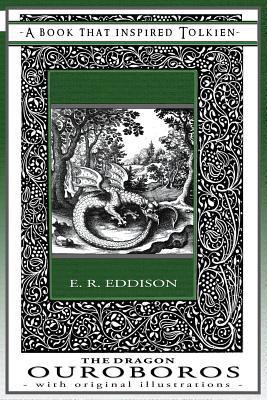THE DRAGON OUROBOROS - A BOOK THAT INSPIRED TOLKIEN. With original illustrations.
This epic tale was first published in 1922 under the title 'The Worm Ouroboros'. Professor J.R.R. Tolkien, who was aged thirty at the time, praised it in print, writing in a letter that he enjoyed Eddison's books 'for their sheer literary merit'. No doubt their influence remained with him as he wrote The Lord of the Rings and The Hobbit. Eddison, Tolkien stated, was 'the greatest and most convincing writer of "invented worlds"' he had ever read.
Tolkien's close friend and confidante, author C.S. Lewis was also an admirer, opining that 'no writer can be said to remind us of Eddison'. Dart-Thornton's new introduction explains the origin of the Ouroboros symbol and discusses Tolkien's critical reaction to Eddison's work. This heroic high fantasy novel is often compared with Tolkien's 'The Lord of the Rings', which was written many years later. 'The Lord of the Rings', however, is written mostly in modern English, while Eddison wrote the greater part of Ouroboros in sixteenth-century English. Ryan Harvey, in 'Where Head and Tail Meet: E. R. Eddison's The Worm Ouroboros' explains that Eddison employed his experience translating Norse sagas and reading medieval and Renaissance poetry, which was, at that time, an almost unique approach among popular fantasy novels. Readers will swiftly become accustomed to Eddison's archaic language and find themselves swept away by the imagery, which is frequently beautiful, for example: . 'The outer ward of the fortress was dark with cypress trees: black flames burning changelessly to heaven from a billowy sea of gloom, ' and 'Enchanted boats, that seemed builded of the glow-worm's light, drifted on the starry bosom of the lake. Over the sloping woods the limbs of the mountains lowered, unmeasured, vast, mysterious in the moon's glamour...' This edition is ornamented with the original pictures printed in the 1922 edition - ten classic illustrations by artist Keith Henderson. It is easy to see why Tolkien was impressed with Eddison's unusual, sprawling and imaginative work, which undoubtedly influenced his creation of 'The Hobbit' and 'The Lord of the Rings'.
